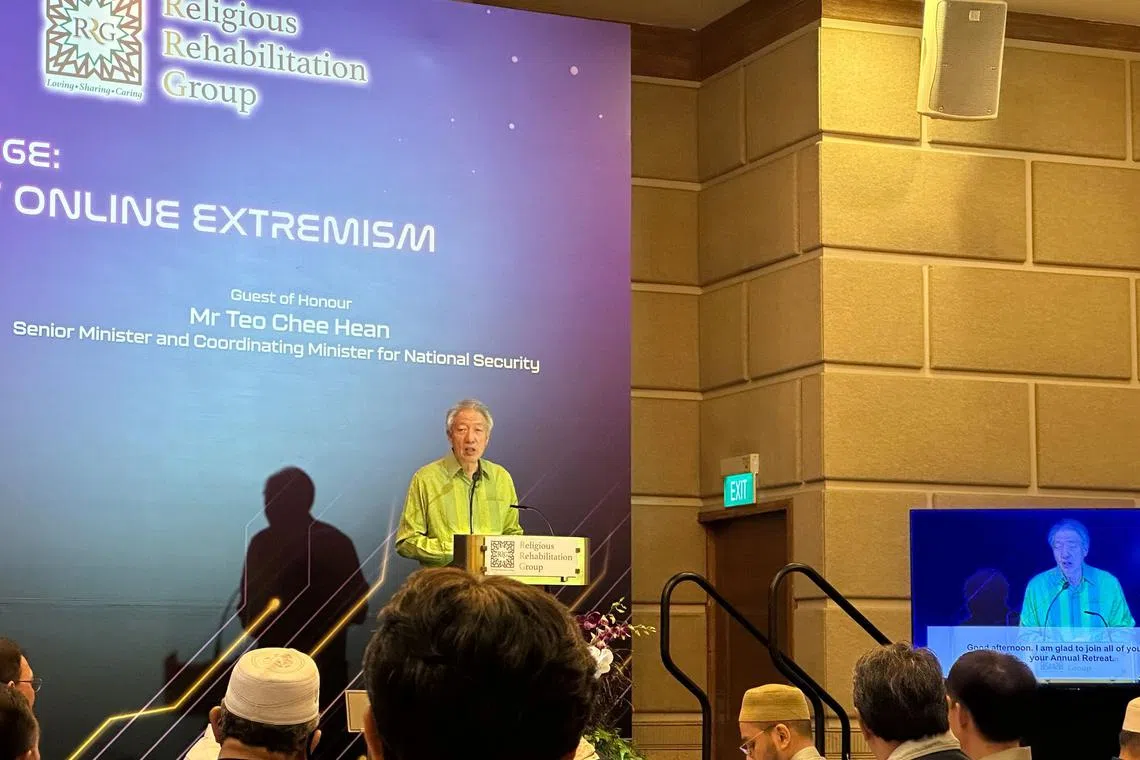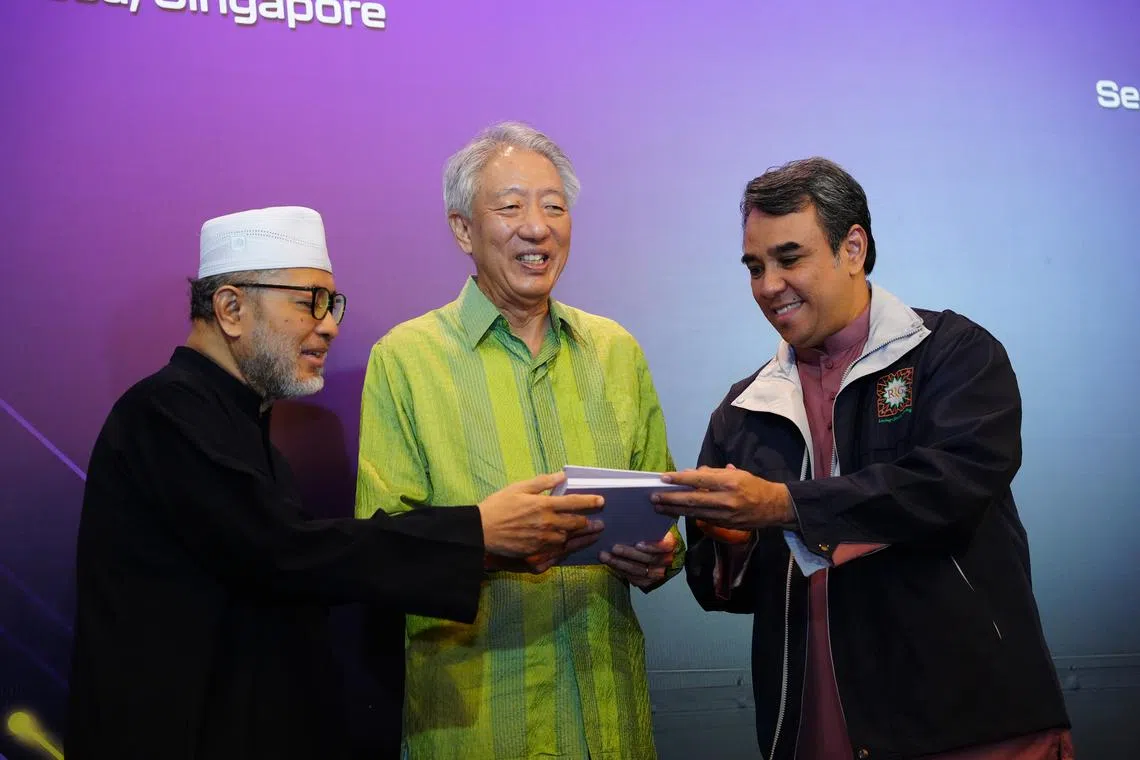12 self-radicalised Singaporean youth dealt with under ISA since 2015
Sign up now: Get ST's newsletters delivered to your inbox

Senior Minister Teo Chee Hean laid out the statistics in his speech at the annual retreat of the Religious Rehabilitation Group.
ST PHOTO: WONG PEI TING
SINGAPORE – Since 2015, 12 self-radicalised Singaporeans aged 20 and below have been dealt with under the Internal Security Act (ISA), with one thing in common – they were all radicalised online.
This group, which includes a 16-year-old who had planned attacks against two Muslims at two mosques in Singapore, makes up almost a third of the 38 people dealt with under the Act in that time.
In comparison, Singapore saw just one case involving a self-radicalised young person before 2015, said Senior Minister Teo Chee Hean on May 29, stressing that this trend is of particular concern.
“Perhaps we will face younger youths being radicalised in future,” he said.
He pointed out that the region continues to face a persistent threat from organised terrorist groups like Jemaah Islamiyah (JI), as seen in the May 17 Ulu Tiram attack in Malaysia.
SM Teo, who is also Coordinating Minister for National Security, laid out these statistics in his speech at the annual retreat of the Religious Rehabilitation Group (RRG), a voluntary group of Islamic teachers who counsel radicalised people and their families. The event took place at Shangri-La Rasa Sentosa.
The statistics expand on a trend highlighted by Prime Minister Lawrence Wong on May 21, when he noted in the wake of the Ulu Tiram attack
The May 17 attack saw a 21-year-old man killing two police officers and injuring another at a police station in Ulu Tiram, Johor, before being shot dead. The suspect’s family members did not mix with others as they believed only they were true Muslims while others were infidels, Malaysian Home Minister Saifuddin Nasution Ismail said on May 23.
Pointing out that the suspect’s father was a JI member, SM Teo, who was speaking in Malay on May 29, said: “RRG members will recall that the JI networks in Singapore had strong links with Ulu Tiram.”
At the same time, global terrorist groups, such as ISIS, continue to inspire attacks and propagate their brand of violent ideology, aided by the internet and social media, he said.
“Youths are actively seeking guidance and meaning in their lives. They can easily come across extremist or terrorist propaganda online,” SM Teo said of the particular challenge with young people.
“Youths become radicalised for complex reasons, including a lack of critical thinking skills, and stresses in their family and other social relationships,” he added.
In conjunction with the 2024 retreat, which is focused on empowering young people against online extremism, the RRG launched a new counselling and mentoring manual to help at-risk youth and those who have been radicalised.
The manual – the fourth the RRG has published so far – addresses the need for continuous evolution in engaging these young people, especially with the use of online media and social media.
Its key features include promoting pro-social Islamic values, strengthening family relationships, and establishing safe, trusting relationships between counsellors and mentees.
It has been almost a decade since RRG launched a counselling manual. Its last manual, released in 2015, was aimed at countering the radical ideology and propaganda of terror group ISIS.
The first two manuals, published in 2003 and 2009, were put together to help counsel JI detainees who were arrested in or after 2001 for their involvement in a plot to commit terrorist attacks in Singapore, as well as tackle self-radicalisation.
TikTok is one of the new avenues of indoctrination, where young people can access content delivered in bite-sized formats, said Ustaz Ahmad Helmi Mohamad Hasbi, 37, who has been counselling radicalised individuals and at-risk youth with the RRG since 2017.
When asked at the event how young people are radicalised online, he told The Straits Times: “(The digital space) is very broad, so it can be anywhere. The trend that I am seeing is more of TikTok, around bite-sized information.”
These young people tend to go on social media platforms with questions they are seeking answers to, said Ustaz Helmi, who is also a senior research analyst at the International Centre for Political Violence and Terrorism Research under the S. Rajaratnam School of International Studies.
It does not help that TikTok operates on an algorithm that decides which videos appear for users based on the kind of content they most want to see, he noted.

Senior Minister Teo Chee Hean with Ustaz Mohamad Hasbi Hassan (left), co-founder and co-chairman of the Religious Rehabilitation Group (RRG) and Ustaz Mohamed Ali, RRG co-chairman, at the annual retreat on May 29.
PHOTO: BERITA HARIAN
That said, young people who are susceptible to such influences usually have psychosocial issues such as low self-esteem, Ustaz Helmi said, noting that half of more than 10 at-risk youth he had engaged in the past year face such problems.
Giving the example of an individual who found it hard to be frank with others, he said the youth had decided that going online allowed him to portray himself as someone he was not in real life, such as by defending someone who wanted to train as a jihadist.
“Youths need to become more discerning with the information they receive (from such platforms),” Ustaz Helmi said.
Ustazah Kalthom Muhammad Isa, 52, who has been counselling people with the RRG since 2005, said that while there is now a manual to aid youth counselling, it should be seen as a pilot effort as more strategies are still needed to counter the wave of online radicalisation.
Keeping watch on the TikTok trend, as well as chat groups where indoctrination further takes place, is par for the course, she added. “Our job is to find many, many ways, and also to get involved with TikTok and online channels, to address this issue, so you can see how busy we are.”
SM Teo said the threat of radicalism and extremism worldwide remains high against the backdrop of a troubled global security landscape, including the war in Gaza. Extremists from the far left and far right of the political spectrum and from different religious backgrounds have resorted to violence, he added.
He cited the example of a six-year-old American Muslim boy in the US who in October 2023 was stabbed and killed by a man
Reiterating that the RRG plays an integral role in Singapore’s response to the threat of radicalism and extremism, SM Teo said: “The Government will give you our full support in this collective effort to keep Singapore safe and secure.”


